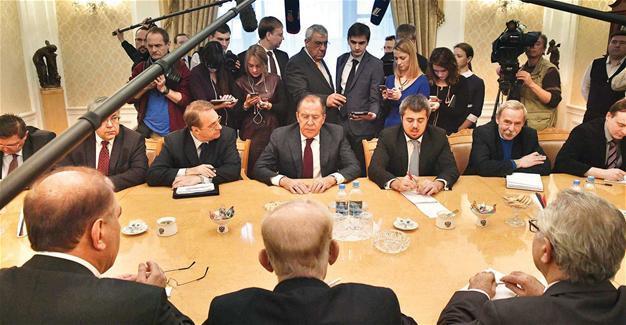Lavrov meets selected Syria opposition, says Geneva talks postponed
MOSCOW

U.N.-hosted negotiations on the Syrian conflict planned for Feb. 8 in Geneva have been postponed until the end of that month, Russian Foreign Minister Sergei Lavrov said on Jan. 27, after a meeting with a group of selected Syrian opposition representatives, though the United Nations said it could not confirm this information.
“The date of Feb. 8 has been put back until the end of next month,” Lavrov told a meeting with minor Syrian opposition representatives in Moscow to discuss peace talks in Kazakhstan that ended on Janç 24, without a major breakthrough.
A spokeswoman for U.N. special envoy Staffan de Mistura said Jan. 27 that the U.N. could not confirm a Russian statement that talks on the Syrian conflict planned for Feb. 8 in Geneva have been postponed.
“There is no confirmation that the February talks are postponed,” said Yara Sharif, according to AFP. “We’re going to be sure when the special envoy is back” from talks next week with U.N. Secretary General Antonio Guterres.
De Mistura was scheduled to update the U.N. Security Council before the Geneva talks, his spokeswoman said.
U.N. spokeswoman Alessandra Vellucci also said the list of those invited to Geneva had not been finalized.
Last month, the U.N. said it “intended” to hold the next negotiations on Feb. 8, and de Mistura has since referred to that date as the “target” for the next round of talks.
Key players Russia, Turkey and Iran backed the Astana talks and the main result was an agreement by the three sides to try to shore up a shaky ceasefire on the ground.
With regards to the opposition meeting in Moscow, Syria’s main opposition leaders on Jan. 26 turned down an invitation from Lavrov for the talks.
High Negotiations Committee (HNC) spokesman Riyad Naasan said that HNC coordinator Riyad Hijab had “received a personal invitation” to attend the Jan. 27 talks “but declined.”
But “no invitation has yet been sent to the High Negotiations Committee,” he added.
The HNC is the main Syrian opposition umbrella group and has taken part in peace in Astana.
The Turkey-based opposition National Coalition also declined to meet with Lavrov, said spokesman Ahmad Ramadan.
He said invitations were sent to the current and past heads of the National Coalition and to the deputy of the sitting chief.
On Jan. 25, Lavrov told Russian lawmakers that he had invited “all the opposition representatives from the political opposition that wish to come to Moscow” for the talks.
He said “we will brief them about what happened in Astana.”
A spokeswoman for the Russian foreign ministry did not name which Syrian opposition groups had been invited to meet with Lavrov.
Meanwhile, Lavrov said that Russia’s draft of the Syrian constitution is an attempt to bring together the approaches of the Arab republic’s government and opposition.
“The draft constitution attempts to pull together and find common points in those approaches there were expounded to us by both the government and opposition over the past few years,” Sputniknews.com quoted Lavrov as saying.
He noted that a lot of “rumors are swirling” around the draft law that Moscow circulated at the Jan. 23-24 intra-Syrian talks in Astana.
“An important conclusion was reached in Astana that the Syrian conflict has no military solution,” Lavrov said.
 U.N.-hosted negotiations on the Syrian conflict planned for Feb. 8 in Geneva have been postponed until the end of that month, Russian Foreign Minister Sergei Lavrov said on Jan. 27, after a meeting with a group of selected Syrian opposition representatives, though the United Nations said it could not confirm this information.
U.N.-hosted negotiations on the Syrian conflict planned for Feb. 8 in Geneva have been postponed until the end of that month, Russian Foreign Minister Sergei Lavrov said on Jan. 27, after a meeting with a group of selected Syrian opposition representatives, though the United Nations said it could not confirm this information.